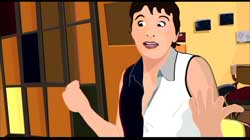 (Two women are having lunch - English professor Lisa Moore and author Carole Dawson)
(Two women are having lunch - English professor Lisa Moore and author Carole Dawson)
Time just dissolves into quick-moving particles that are swirling away. Either I'm moving fast or time is. Never both simultaneously.
It's such a strange paradox. I mean, while, technically, I'm closer to the end of my life than I've ever been, I actually feel more than ever that I have all the time in the world. When I was younger, there was a desperation, a desire for certainty, like there was an end to the path, and I had to get there.
I know what you mean, because I can remember thinking, "Oh, someday, like in my mid-thirties maybe, everything's going to just somehow gel and settle, just end." It was like there was this plateau, and it was waiting for me, and I was climbing up it, and when I got to the top, all growth and change would stop. Even exhilaration. But that hasn't happened like that, thank goodness. I think that what we don't take into account when we're young is our endless curiosity. That's what's so great about being human.
Yeah, yeah. Well do you know that thing Benedict Anderson says about identity?
No.
Well, he's talking about like, say, a baby picture. So you pick up this picture, this two-dimensional image, and you say, "That's me." Well, to connect this baby in this weird little image with yourself living and breathing in the present, you have to make up a story like, "This was me when I was a year old, and then later I had long hair, and then we moved to Riverdale, and now here I am." So it takes a story that's actually a fiction to make you and the baby in the picture identical to create your identity.
And the funny thing is, our cells are completely regenerating every seven years. We've already become completely different people several times over, and yet we always remain quintessentially ourselves.
Hmm.
***